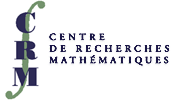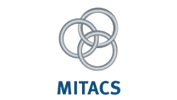 |
|
||||
Org: Janusz A. Adamus (Western)
[PDF]
- ANDREI GABRIELOV, Purdue University, West Lafayette, IN 47907-2067, USA
Dessins d'Enfants for the Eigenfunctions of Anharmonic Oscillator [PDF] -
Eigenfunctions of the Schrodinger operator on the real line with a polynomial potential are associated with certain properly embedded infinite planar trees. The braid group action on the trees helps to understand the dependence of the eigenfunctions and the corresponding eigenvalues on the coefficients of the potential. For several classes of potentials, including the even quartic potential known as anharmonic oscillator, the action of the braid group is computed and irreducibility of the spectral determinant is derived from the transitivity of that action.
- PINAKI MONDAL, University of Toronto, Toronto, ON, Canada
Projective completion of affine varieties via degree-like functions [PDF] -
Filtrations, or equivalently, integer valued `degree-like functions' on the ring of regular functions of an affine algebraic variety X (defined over an algebraically closed field K) defines a projective completion of X. We study the degree-like functions which are `finite type', i.e., are determined by the maximum of a finite number of `semidegrees', by which we mean degree-like functions that send products into sums. We characterize the latter type completions as the ones for which ideal I of the `hypersurface at infinity' is radical. We prove that these completions are also `nonsingular at codimension one' at infinity, i.e., the local rings along the components of the hypersurface at infinity are regular and hence discrete valuation rings. Moreover, we establish a one-to-one correspondence between the collection of minimal associated primes of I and the unique minimal collection of semidegrees needed to define the corresponding degree-like function. Completions corresponding to the finite type degree-like functions generalize in a natural way toric varieties corresponding to polytopes. We present an `iterated' procedure of constructing semidegrees (which induce non-toric completions) and finish with an application involving an explicit affine Bezout-type theorem.
- ARMIN RAINER, University of Toronto, 40 St. George St., Toronto, ON M5S 2E4, Canada
Quasianalytic perturbation of polynomials and linear operators [PDF] -
Given a smooth family of complex univariate polynomials (resp. normal matrices), it is natural to study the regularity of its roots (resp. its eigenvalues and eigenvectors). Using resolution of singularities, considerable progress was recently made for quasianalytic multiparameter families of polynomials (resp. matrices). Similar perturbation results can be obtained for quasianalytic families of unbounded normal operators with compact resolvent and common domain of definition. This requires a differential calculus for quasianalytic mappings beyond Banach spaces, which we recently developed for some quasianalytic Denjoy-Carleman classes.
Joint work with A. Kriegl and P. Michor.
- CHRISTIANE ROUSSEAU, Université de Montréal
Singularities of analytic dynamical systems with 1-summable normalizing transformation [PDF] -
A central problem in local dynamics is the equivalence problem: when are two systems locally equivalent under a change of coordinates? In the neighborhood of a singular point, representatives of equivalence classes could be given by normal forms. But, very often, the changes of coordinates to normal form diverge. In this talk, we will discuss the case of singularities for which the normalizing transformation is 1-summable, thus allowing to provide moduli spaces. We will explain the common geometric features of these singularities, and how the study of the unfolding of these singularities allows understanding the singularities themselves. We will also present examples of moduli spaces for generic 1-parameter families unfolding such families.
- RASUL SHAFIKOV, the University of Western Ontario
Holomorphic closure dimension of real analytic sets [PDF] -
Given a real analytic (or, more generally, semianalytic) set R in the n-dimensional complex space, there is, for every point p in the closure of R, a unique smallest complex analytic germ Xp that contains the germ Rp. We call the complex dimension of Xp the holomorphic closure dimension of R at p. We show that the holomorphic closure dimension of an irreducible R is constant on the complement of a closed proper analytic subset of R, and discuss the relationship between this dimension and the CR dimension of R.
This is joint work with J. Adamus.
- PATRICK SPEISSEGGER, McMaster University, 1280 Main St. W, Hamilton, ON L8S 4K1
A definable version of Haefliger's Theorem [PDF] -
A version of Haefliger's Theorem due to Moussu and Roche states that if M is an analytic, simply-connected manifold and d is an analytic and integrable distribution on M of codimension 1, then there is no closed, differentiable curve in M that is transverse to d. It follows that every leaf of d is a so-called Rolle leaf, which are the basic building blocks in pfaffian geometry. Haefliger's Theorem is false without the analyticity assumption, but a weaker form of his theorem remains true if "analytic" is replaced by "definable in an o-minimal structure". I will state (and give an idea of the proof of) this weaker theorem and discuss the relevance (or lack thereof) of both theorems to pfaffian geometry.
Joint work with Jean-Marie Lion.
- MARK SPIVAKOVSKY, Univ. of Toulouse 3, Institut de Mathematiques de Toulouse, 118, route de Narbonne, 31062 Toulouse cedex, France
On local uniformization in arbitrary characteristic [PDF] -
In this talk we shall present some recent work on the problem of local uniformization in arbitrary (equal) characteristic. Our methods are mainly commutative-algebraic: valuation theory, and, more specifically, the recently developed theory of key polynomials.
- JAROSLAW WLODARCZYK, Dept. of Mathematics, Purdue University, West Lafayette, IN 47907
Resolution algorithm in characteristic zero and its possible extension in positive characteristic [PDF] -
We discuss the basic ideas of the Hironaka algorithm for the resolution of singularities of algebraic varieties in characteristic zero and its extension in positive characteristic.





